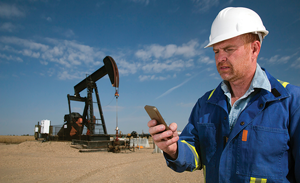
|
| Run into a problem on the job? Social media groups can be a great place to ask questions and find answers. |
I can remember drilling in very isolated places with no communication at all. If we ran into problems, we had to figure it out for ourselves or face a train wreck. This self-sufficiency led to an interesting trait among drillers — secretiveness. In the old days, a lot of guys figured that if they had to figure it out for themselves, they weren’t about to share it with anybody. This led to the invention of a lot of the tools and techniques that we all use today, but it also led to a lot of “re-inventing the wheel.” Many times, I’ve been to trade shows where a manufacturer would come out with a new tool and one driller after another would come by the booth and say, “I built one of those years ago. Worked pretty good …”
Whether we like it or not, the world we drill in has changed. There is practically nowhere on the planet that is out of touch. This can be a double-edged sword, though. Sometimes the front office wants to know what you are doing from minute to minute, and tries to micromanage everything from afar. This does not always lead to a harmonious outcome, especially if you are being micromanaged by a young engineer with a brand new degree that doesn’t even know for sure which end of the derrick goes up.
The other side of the coin is very helpful. With our modern phones, pads and mobile computers, we are able to communicate in real time to anyone we need to solve a problem. I am a member of a large number of groups on various websites, like Facebook, LinkedIn, etc. On these sites there are lots of groups that are made up of people with like interests. For instance, I participate in groups for water well drillers, oil well drillers, borehole fishermen, company men and a bunch more. When I run into a problem in the field, I can usually get on and get help from somebody in real time that has been there, done that. We all send pictures back and forth too, to make understanding of the problem easier.
This technology has opened up the drilling world and made all of our jobs easier and more productive. It has also made drillers a lot more cooperative with one another. We have come to realize that we don’t have it “all knowed up,” and there might actually be a better way out there somewhere if we just reach out and communicate. It also helps that the communication is worldwide. We still might not want to give our secrets to the guy right down the road, but a driller in a bind 2,000 miles away — now that’s another story. And he’ll help you too, when you need it. I’ve got contacts in over 30 countries, and once we get by the language barrier, drilling is drilling.
Now, I’m gonna tell a story that took place in a chat group on a social media site recently. I’m not gonna name anybody. The guilty parties know who they are. We were discussing drilling in lost circulation zones. Everybody had their own ways of dealing with it. A lot of techniques are site-specific, and won’t always work in another part of the world, but it was great to see some real live thinking and problem solving going on in real time. One of the things everybody agreed on was to get the mud right. OK. That is pretty standard, but when we got into the discussion, I realized that a lot of guys were confusing weight with viscosity. There is a difference. They would say, “I just make up some heavy mud, etc …”
When I do solids control seminars, I have a demonstration that works every time and makes it so the information sticks. When we get into the discussion of mud weight and viscosity, I produce a couple fruit jars, one half full of 140wt gear oil, and one full of water. I ask the group which one is heavier. Trick question. I always get one or two guys to say the oil is heavier, which is just what I expected. I then pour the water into the oil. It goes straight to the bottom. The oil is thicker, but the viscosity is much higher. It is standard practice to increase the viscosity of the mud to combat fluid losses, but if you increase the weight, you are defeating your purpose and will probably knock the bottom out of your hole.
These are just some of the discussions that we have and most of them take place in real time, which is very helpful on location, in the middle of a problem. I would suggest that you get on a site like Facebook. It’ll help. You can look me up, and I can hook you up with groups that will make your life easier, or at least pass the time when you are sitting there on a 24-hour pump test with nothing to do.
For more Wayne Nash columns, visit www.thedriller.com/wayne.




Report Abusive Comment